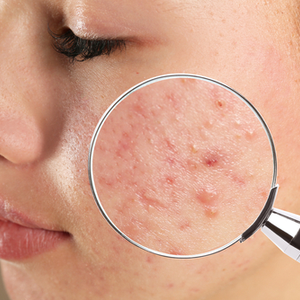
What is acne?
Acne, also known as acne vulgaris, is one of the most common skin diseases worldwide. Between 70 and 95 percent of all adolescents in puberty suffer from acne. On average, boys are affected more often and more severely by acne than girls. The inflammatory skin changes caused by acne are visible as pimples, blackheads, pustules and oily skin. Acne is particularly common on the face, neck, décolleté and upper body. In some cases, acne can also occur under the armpits, in the genital, buttock or groin area. The skin disease usually subsides on its own after puberty. Depending on the severity, between 15 and 30 percent of all patients need medical treatment.
What causes acne?
While sebum, sweat and other substances are excreted through normal skin pores, acne is characterised by increased sebum formation (seborrhoea) and is usually accompanied by a cornification disorder of the sebaceous gland follicles. The dead skin cells from the sebaceous follicle block the follicle outlet. As a result, the sebum cannot penetrate the skin surface and accumulates at the sebaceous follicle. The result is a so-called sebaceous horny plug, a skin-coloured, pinhead-size skin excrescence. It is an ideal breeding ground for bacteria, in which pus accumulates.
What contributes to the development of acne?
Doctors believe that there are many internal and external factors that can contribute to the development of acne. These include:
- hereditary factors, which play a role in the development of acne that should not be underestimated,
- an irregular menstrual cycle as well as pregnancies can influence the course of acne,
- the climate as well as humidity and UV radiation can influence acne,
- numerous medications can cause acne or worsen the skin's appearance,
- psychological factors such as stress can have an effect on the course of the disease,
- male sex hormones (androgens), skin lipids and regulating neuropeptides are significantly involved in the development of acne,
- in some patients, the diet can influence the disease: a diet predominantly rich in sugar and carbohydrates as well as a high consumption of dairy products can worsen the skin condition due to a high insulin release. According to the current state of medical research, however, there are no precise dietary tips for the treatment of acne.
How can acne be distinguished from blemishes?
The typical skin appearance of acne is characterised by small pustules (pimples), blackheads (comedones), reddened skin bumps (papules), larger pus-filled blisters (pustules) and/or oily skin. The latter is caused by the overproduction of the sebaceous glands. The skin shines oily and forms more blackheads and pimples due to the clogged pores of the sebaceous glands. But the thickening of the top layer of skin (horny layer), which goes hand in hand with a widening of the skin pores, is also a typical sign of acne.
How is acne treated?
In most cases, no treatment is necessary because acne clears up on its own after puberty. However, in a majority of mostly women, acne can persist beyond the age of 25. Two to seven percent of all patients also complain about scars caused by acne. If acne is combated, for example, by improperly squeezing out pimples and blackheads alone, this can contribute to a worsening of the skin's appearance and this scarring. Intensive cleansing or disinfecting of the skin, as well as excessive concealing with make-up, can further encourage acne. As a rule, patience and perseverance are therefore the be-all and end-all in the successful treatment of acne. In addition to suppressing the excessive formation of sebum, bacterial infections, for example, should also be treated. In addition, the skin should be stimulated to regenerate and cornification disorders should be eliminated. Over-the-counter products can already provide a remedy here. In particularly severe cases of acne, however, the doctor will prescribe an acute therapy.
What should I pay special attention to when caring for acne?
Patients with acne should use pH-neutral wash lotions, soaps and/or moisturisers. These should be water-based. Oily or greasy creams should be avoided as much as possible. Those who use make-up and sunscreen should make sure that these products are also as oil-free as possible.
What can be done about acne scars?
The appearance of acne scars can be improved. Depending on the severity of the scars, different treatment methods can be used:
- Operations to flatten scar edges or undermine scar valleys,
- Laser treatment,
- chemical scar treatment,
- Dermatofiller,
- Microdermabrasion, or microneedling, in which the skin is superficially scratched by fine needles and stimulated to repair itself,
- Cold therapy,
- Pressure treatment, which is said to contribute to reduced blood circulation and slower metabolism of the hub tissue.
